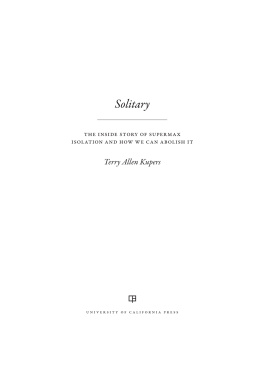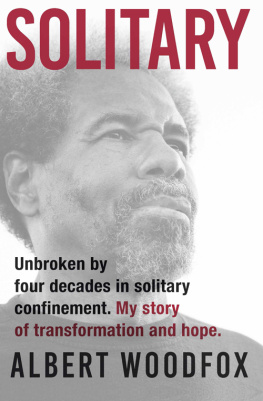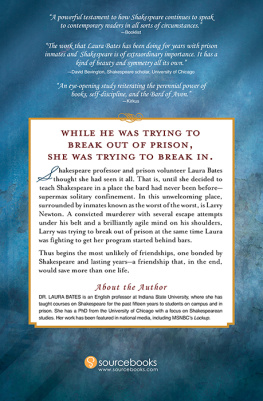Kupers - Solitary: the Inside Story of Supermax Isolation and How We Can Abolish It
Here you can read online Kupers - Solitary: the Inside Story of Supermax Isolation and How We Can Abolish It full text of the book (entire story) in english for free. Download pdf and epub, get meaning, cover and reviews about this ebook. year: 2017, publisher: University of California Press, genre: Politics. Description of the work, (preface) as well as reviews are available. Best literature library LitArk.com created for fans of good reading and offers a wide selection of genres:
Romance novel
Science fiction
Adventure
Detective
Science
History
Home and family
Prose
Art
Politics
Computer
Non-fiction
Religion
Business
Children
Humor
Choose a favorite category and find really read worthwhile books. Enjoy immersion in the world of imagination, feel the emotions of the characters or learn something new for yourself, make an fascinating discovery.
- Book:Solitary: the Inside Story of Supermax Isolation and How We Can Abolish It
- Author:
- Publisher:University of California Press
- Genre:
- Year:2017
- Rating:4 / 5
- Favourites:Add to favourites
- Your mark:
- 80
- 1
- 2
- 3
- 4
- 5
Solitary: the Inside Story of Supermax Isolation and How We Can Abolish It: summary, description and annotation
We offer to read an annotation, description, summary or preface (depends on what the author of the book "Solitary: the Inside Story of Supermax Isolation and How We Can Abolish It" wrote himself). If you haven't found the necessary information about the book — write in the comments, we will try to find it.
Kupers: author's other books
Who wrote Solitary: the Inside Story of Supermax Isolation and How We Can Abolish It? Find out the surname, the name of the author of the book and a list of all author's works by series.
Solitary: the Inside Story of Supermax Isolation and How We Can Abolish It — read online for free the complete book (whole text) full work
Below is the text of the book, divided by pages. System saving the place of the last page read, allows you to conveniently read the book "Solitary: the Inside Story of Supermax Isolation and How We Can Abolish It" online for free, without having to search again every time where you left off. Put a bookmark, and you can go to the page where you finished reading at any time.
Font size:
Interval:
Bookmark:

Dr. Kupers gives us a front-row seat to Americas tragic experiment in mass incarceration and one of its most devastating, cruel, and painful practices: solitary confinement. Kuperss unflinching insight into the hidden world of prisons exposes America at its darkest, but at the same time offers concrete solutions and hope for a safer, more effective, and humane criminal justice system.
Amy Fettig, Deputy Director, American Civil Liberties Union National Prison Project
Terry Kuperss wisdom, humanism, and generosity have helped advocates and litigators across the United Statesnot to mention countless prisonersseeking to curb solitary confinement. His commitment to the well-being and dignity of every person behind bars has shaped his work and immeasurably enriched the prison reform movement. We are all in his debt.
Jamie Fellner, former Director, US Program, Human Rights Watch
The most prominent psychiatric expert witness in prison solitary confinement litigation is now the most important author in the field. The analysis is powerful and fits within a dramatic narrative of actual cases: inmates broken by the terrifying isolation that is solitary confinement.
Fred Cohen, Professor Emeritus, University at Albany, State University of New York, and Executive Editor, Correctional Law Reporter
Terry Allen Kupers

UNIVERSITY OF CALIFORNIA PRESS
University of California Press, one of the most distinguished university presses in the United States, enriches lives around the world by advancing scholarship in the humanities, social sciences, and natural sciences. Its activities are supported by the UC Press Foundation and by philanthropic contributions from individuals and institutions. For more information, visit www.ucpress.edu.
University of California Press
Oakland, California
2017 by Terry Allen Kupers
Library of Congress Cataloging-in-Publication Data
Names: Kupers, Terry Allen, author.
Title: Solitary : the inside story of supermax isolation and how we can abolish it / Terry Allen Kupers.
Description: Oakland, California : University of California Press, [2017] | Includes bibliographical references and index.
Identifiers: LCCN 2017002267 (print) | LCCN 2017008047 (ebook) | ISBN 9780520292239 (cloth : alk. paper) | ISBN 9780520965737 (ebook)
Subjects: LCSH : Solitary confinementUnited StatesPsychological aspects. | PrisonersMental healthUnited States.
Classification: LCC HV 9471 . K 86 2017 (print) | LCC HV 9471 (ebook) | DDC 365/.33dc23
LC record available at https://lccn.loc.gov/2017002267
Manufactured in the United States of America
26 25 24 23 22 21 20 19 18 17
10 9 8 7 6 5 4 3 2 1
I am blessed to have worked on jail and prison litigation with some of the very best constitutional lawyers in the country, who care deeply about the prisoners and families they serve. Without public interest attorneys, the rights of disempowered people would never see the light of public notice. Here is a partial list, with much gratitude: Terry Smerling, Don Specter, Mike Satris, Allyson Hardy, Sarah Norman, Steven Fama, Sid Wolinsky, Jody Owens, Alesha Judkins (senior advocate), Margaret Winter, David Fathi, Gabe Eber, Steve Berlin, Eric Balaban, Elizabeth Alexander, Amy Fettig, Carl Takei, Alan Mills, Steve Hanlon, Warren George, Peter Eliasberg, Dennis Cunningham, Don Lipmanson, Anita Arriola, Ernest Galvan, Charles Carbone, Michael Bien, Luther Orton, Keith Wattley, Jane Kahn, Sanford Rosen, Bob Fleischner, Staughton Lynd, Alice Lynd, Jules Lobell, Alexis Agathocleous, Carol Strickman, Carol Travis, Marilyn McMahon, Anne Weil, Sharon Dolovich, Sunday Rossberg, Eric Olson, Nick Straley, LaRond Baker, Emily Cooper, Margaret Chen, Sarah Dunne, Erin Sullivan, Deborah LaBelle, Molly Reno, Patricia Streeter, Sarah Kerr, Betsy Sterling, Nina Loewenstein, Sandy Girard, Cynthia Chandler, Peter Cubra, Ken Falk, Margo Schlanger, Millard Murphy, Richard Goff, Bret Grote, Catherine Campbell, David Lew, Azadeh Zohrabi, Harold Hirschman, Ben Salk, Nancy Alisberg, Robert Navarro, Sonia Mercado, Sam Paz, Barry Litt, Ron Kaye, David McLane, Marilyn Bednarsky, Caitlin Weisberg, Lindsay Battles, Ellen Barry, Eva DeLair, Mark Donatelli, Andree Larose, Jennifer Giuttari, Michael Pitt, Mark Vermeulen, Sarah Chester, and Michael Mushlin.
Its terribly unfortunate that most people think those who dwell in our jails and prisons are heinous criminals. Most prisoners today ran afoul of the law because they were using or selling drugs. To be sure, we dont want to foster a black market in illicit substances. But are long prison terms the answer? I find that prisoners are fairly ordinary people: that is, when I first meet them, I sense that, if not for fortune, they might be part of my community or my personal life.
Once prisoners go to jail, they are trained to acquiesce. Do not argue with a correction officer, they are told. If you do, you can be beaten or carted off to a solitary cell. So with this level of intimidation, how do prisoners gather the courage to sue the state or federal government that incarcerates them? When I sit in the federal courtroom in Detroit and hear the testimony of women prisoners who have been sexually abused by prison staff, I am awed. These women have been taught they should be ashamed, yet they stand up in court and protest that their rights have been violated. And I am awed by the jailhouse lawyers, and the ten prisoners who were brave enough to sign on as named plaintiffs in the Ashker v. Brown class action lawsuit. Ultimately, prisoners (and ex-prisoners) are the heroes in this struggle. I will name a few, but there are many others: Mumia Abu-Jamal, Dan Pens, Willie London, Raymond C. (Chuck) Walen and the legal team at Michigan Prisoner Legal Services, Willie Russell, Steve Czifro, Dolores Canales, Hank Skinner, Danny Murillo, Brian Nelson, Five Mualimm-ak, Donna Wilmott, Linda Evans, Penny Schoner, Luis Bato Talamantez, Dorsey Nunn, Manuel La Fountaine, Robert King, Daisy Benson, ONeil Stough, Claud Marks, Ed Mead, Rita Bo Brown, Donny Donaldson, Stephen Donaldson, Diana Block, Tom Cahill, Sarah Shourd, Shane Bauer, Paul Wright, the leaders of the California hunger strikes of 201113, and the named plaintiffs in Ashker v. Brown : Todd Ashker, Danny Troxell, Ronnie Yandell, Ronald Dewberry, Lewis Powell, Paul Redd, James Williamson, Arturo Castellanos, Alfred Sandoval, George Franco, Antonio Guillen, Jeffrey Franklin, George Ruiz, Gabriel Reyes, Richard Johnson, and Luis Esquivel.
Activists in the broad movement to reshape the criminal justice system share the memory of their horror when they were introduced to the gruesome reality of our jails and prisons. Once they went in and looked about, they could not return to llife as usual without speaking out and trying to end some of the horrors they had witnessed. Without the activists the class action lawsuits would not be effective and change would be unlikely. There are too many committed activists to name, but I will begin with these: Jamie Fellner, Angela Browne, Corey Weinstein, Judy Greenspan, Angela Davis, Ruth Gilmore, Craig Gilmore, Helen Grimes, Laura Magnani, Ron Ahnen, Dorsey Nunn, Ida Robinson, Esther Lin, Don Sabo, Sandrine Ageorges, Karen Shain, Jody Sokolower, Tom Quinn, Kiilu Nyashi, Barbara Becnel, Joanne Mariner, Lovisa Stannow, David Kaiser, Matt Lowen, Helen Grimes, Georgia Shreiber, Bonnie Kerness, Keramet Reiter, Mike Castell, Patricia Hilden, Terry Day, Miranda Bergman, Felix Shafer, Rose Braz, Leslie DiBenedetto Skopek, Naneen Karraker, Joyce Miller, Dylan Rodriguez, Cassandra Shaylor, Nancy Stoller, William Buzz Alexander, Noel Hanrahan, Heather Rice-Minus, and Rev. Markle Downton.
Font size:
Interval:
Bookmark:
Similar books «Solitary: the Inside Story of Supermax Isolation and How We Can Abolish It»
Look at similar books to Solitary: the Inside Story of Supermax Isolation and How We Can Abolish It. We have selected literature similar in name and meaning in the hope of providing readers with more options to find new, interesting, not yet read works.
Discussion, reviews of the book Solitary: the Inside Story of Supermax Isolation and How We Can Abolish It and just readers' own opinions. Leave your comments, write what you think about the work, its meaning or the main characters. Specify what exactly you liked and what you didn't like, and why you think so.









